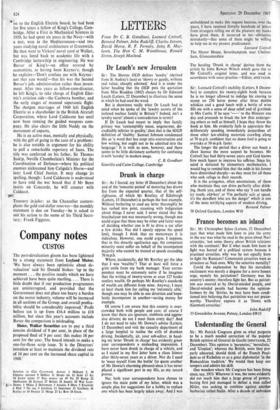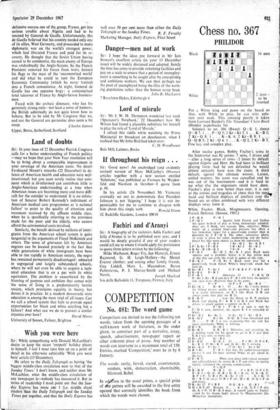Understanding the General
Sir: Mr Patrick Cosgrave gives us what purports to be a much needed correction of the popular British opinion of General de Gaulle (SPECTATOR, 22 December). This opinion is 'paranoiac,' moralistic,' and 'Utopian': whereas the British, were they pro- perly educated, should think of the French Presi- dent as of Richelieu or as a great diplomatist 'in the Bismarckian tradition.' We would then keep our tempers and admire his skill.
One wonders where Mr Cosgrave has been living since, say, 1933. Wherever it was, the news evidently did not reach him that a large group of powers, having first just managed to defeat a man called Hitler, was seeking to combine against another barbarian called Stalin. After a decade of unbroken defensive success one of the group, France, got into serious trouble about Algeria and had to be
rescued by General de Gaulle. Unfortunately, this de Gaulle believed that his country needed only one of its allies, West Germany, and proceeded to make diplomatic war on the world's strongest power, which had liberated France and paid for its re- covery. He thought that the Soviet Union having ceased to be communist, the main enemy of Europe was undoubtedly the Anglo-Saxons. So the French President removed his forces from NATO, hoisted his flags to the mast of the 'uncommitted world' and did what he could to turn the European Economic Community (which he never trusted) into a French convenience. At night, General de Gaulle has one supreme bogy: a computerised total takeover of France by Anglo-Saxon business- men.
Faced with the archaic dinosaur, who has his genuinely strong suits—not least a sense of humour, the British admittedly do not quite know how to behave. But to be told, by Mr Cosgrave that we, and not the General are paranoiac does seem a bit
steep. Charles Janson Uppat, Brora, Sutherland, Scotland











































 Previous page
Previous page